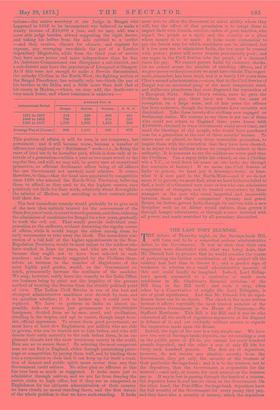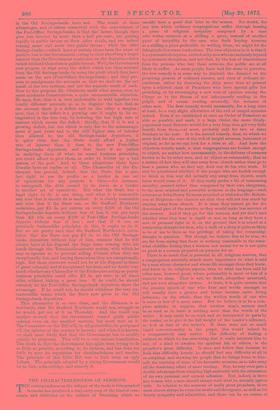THE LAST TORY BLUNDER.
THE debate of Thursday night, on the Savings-bank Bill, will turn out to be a somewhat serious administrative defeat to the Government. It was so clear that their own supporters were dissatisfied with what was being done, that Mr. Disraeli had to promise that he would consider the course of postponing the further consideration of the subject till the country had had time to discuss it ; and a greater sign of weakness in relation to a small administrative measure of this sort could hardly be imagined. Indeed, Lord Esling- ton's speech amounted to a confession of much more confidence in Mr. Gladstone's financial criticism of the Bill than in the Bill itself ; and such a step, when taken by a Conservative of weight like Lord Eslington, is one of great significance. And that Mr. Disraeli felt its signi- ficance there can be no doubt. The check is the more serious because it affects especially the most trusted member of the Conservative Government in the House of Commons,—Sir Stafford Northcote. This Bill is his Bill, and it was he who exhausted all the stock of ingenious arguments at his disposal in defence of it, and yet evidently without success as regards the impression made upon the House.
Indeed, the logic of the case is a very simple one. We have now two sets of Savings-banks deposits, one set entailing a cost on the public purse of £3 5s. per annum for every hundred pounds deposited, and the other a cost of only £2 10s. for
every such hundred pounds. The first set of depositors, however, do not receive any absolute security from the Government, they get only the security of the trustees of their particular Savings-bank ; and it is to the trustees, not to the depositors, that the Government is responsible for the interest ;—and only, of course, for such moneys as the trustees pay in. If any is lost in passing through the hands of a trustee, the depositor loses it, and has no claim on the Government. On the other hand, the Post-Office Savings-bank depositors have the full security of the Government for every penny they pay, and they have also a security of secrecy, which the depositors
in the Old Savings-banks have not. The result of these advantages, and of others connected with the convenience of the Post-Office Savings-banks, is that the latter, though they give less interest by more than a half per cent., are gaining rapidly in public favour on their older rivals, and are indeed coming more and more into public favour ; while the older Savings-banks,—which have at certain times been the cause of positive loss to the Government, owing to their absorbing a larger interest than the Government could earn on the deposits,—have rather declined than risen in public favour. Well, the Government now propose to wipe away the deficit which has thus accrued from the Old Savings-banks by using the profit which they have made on the new (Post-Office) Savings-banks ; and they pro- pose to amalgamate the accounts so that we shall see the net result of the two systems, and not the separate result of each. Now to this proposal Mr. Gladstone made what seems, even to some moderate Conservatives, a quite unanswerable objection. He says, first, that it is very undesirable to weld together two totally different accounts so as to disguise the fact that on one account there is a deficit and on the other a surplus ; next, that if the deficit is a growing one it ought to be ex- tinguished in the true way, by lowering the too high rate of interest which causes the deficit ; thirdly, that if it is not a growing deficit, but one which is only due to the mismanage- ment of past years and to the still higher rate of interest then allowed to the old Savings-banks depositors, it is quite clear that the State could afford a higher rate of interest than it does to the new Post-Office Savings-banks depositors, and that there is no justice in mulcting them of what, an sound business principles, you -could afford to give them, in order to bolster up a bad system of the past. And to these allegations there have literally been no replies at all. The Chancellor of the Ex- chequer has proved, indeed, that the State has a per- fect right to use its profits as a banker in one set of operations for any purpose it likes,—for instance, to extinguish the debt caused by its losses as a banker in another set of operations. But what the State has a legal right to do is one thing, and what it is reasonable and wise that it should do is another. It is clearly reasonable and wise that if the State can, as Sir Stafford Northcote maintains, pay £3 58. per annum on every £100 of the Old Savings-banks deposits without fear of loss, it can pay more than £2 10s. on every £100 of Post-Office Savings-banks deposits without fear of loss ; and that if it can on genuinely businesslike principles do this, it ought to do it. But we are pretty sure that Sir Stafford Northcote's calcu- lation that the State can pay £3 5s. to the Old Savings- banks depositors without fear of loss, assumes that he will always have at his disposal the large sums coming into his hands through the Terminable-annuity system, with which he may so operate as to prevent selling Consols when they are exceptionally low, and buying them when they are exceptionally high. But these resources would not be at his disposal in times of great calamity and of exceptional burdens, and we doubt very much whether any Chancellor of the Exchequer acting on purely business principles could offer £3 5s. per cent, in all times alike, without risking a great loss. If he could, he should certainly let the Post-Office Savings-bank depositors share the advantage. If he could not, he should withdraw the very un- businesslike bonus which the State now gives to the Old Savings-bank depositors.
This alternative is so very clear, and the dilemma is so inevitable, that Sir Stafford Northcote could not, struggle as he would, get out of it on Thursday. And the result was another avowal that the Government cannot guide public opinion even on the smallest matters, but must wait on it. The Committee on the Bill will, in all probability, be postponed till the opinion of the country is known ; and when it is known, we shall most likely find that the Government has to modify greatly its proposals. This will be a very serious humiliation. The truth is, that the Government has again been trying to do as little as possible, according to its fashion, and has done too little to save its reputation for clearheadedness and resolve. The principle of this little Bill was to hide away an ugly failure. The principle adopted by a strong Government would be to face, acknowledge, and remedy it.



































 Previous page
Previous page